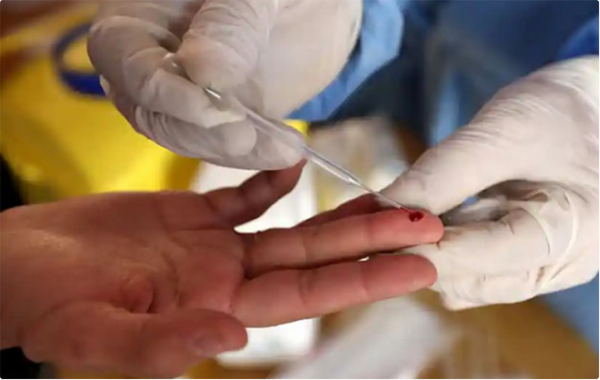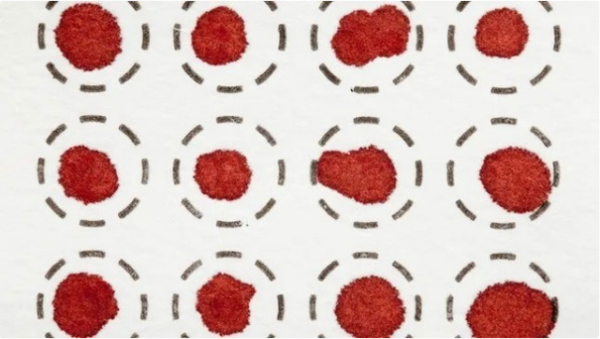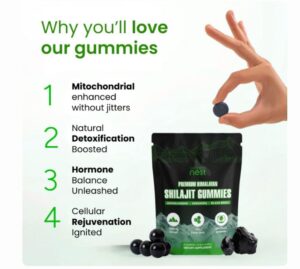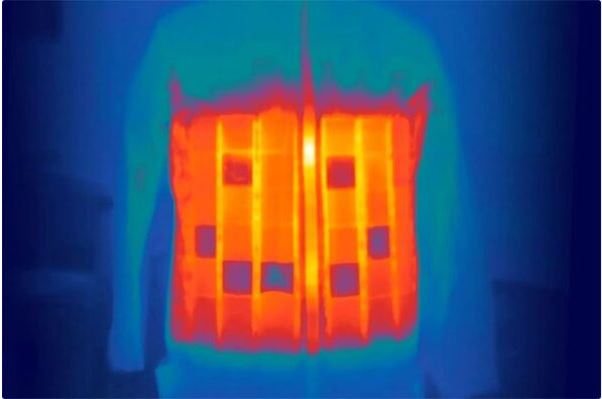A new tool, aided by artificial intelligence (AI), can identify the three most dangerous types of cancer within minutes using just a drop of dried blood.
Initial tests by Chinese scientists demonstrate that this tool can distinguish patients with pancreatic, stomach, or colorectal cancer from healthy individuals within a few minutes using just a spot of dried blood.
The tool employs machine learning, a branch of AI, to analyze metabolic byproducts, known as metabolites, in blood samples. These metabolites, found in serum, serve as “biomarkers” capable of detecting the presence of cancer in the body, according to LiveScience on April 23.

The new test requires less than 0.05ml of blood to diagnose cancers – (Illustration: REUTERS).
Screening for biomarkers in the blood has been proposed as a potential method to diagnose early-stage cancer when survival rates are higher and patients exhibit no obvious symptoms.
Pancreatic, stomach, and colorectal cancers, despite being among the deadliest cancers globally, currently lack independent blood tests accurate enough for individual diagnoses. Instead, doctors typically rely on imaging or surgery to identify cancerous tissue.
This innovative tool uses machine learning to analyze metabolites in blood samples. These metabolites, found in serum, act as biomarkers signaling the presence of cancer.
Although these cancers are among the world’s deadliest, pancreatic, colorectal, and stomach cancers currently lack reliable independent blood tests for self-diagnosis.
In theory, this new test needs less than 0.05 ml of blood to diagnose these cancers. Chinese scientists, who developed the test, detailed their findings in a paper published on April 22 in the journal Nature Sustainability.
This tool has also proven effective in distinguishing between cancer patients and healthy individuals.
Research indicates that testing with dried blood is as effective as testing with liquid blood. In one trial, dried blood testing detected 81.2% of pancreatic cancer cases, compared to 76.8% with liquid blood samples.
Dr. Chaoyuan Kuang of Albert Einstein College of Medicine (USA), who was not involved in the study, noted that dried serum can be “collected, stored, and can be transported at a lower cost and with much simpler equipment compared to liquid blood.
However, he cautioned that several more years of research are needed before this test can be widely available to the public.
Currently, in the US, there is only one test approved by the Food and Drug Administration for diagnosing pancreatic cancer—the CA19-9 method. Current tests detect the metabolite with about 80% accuracy when cancer symptoms are present, but only 13% of asymptomatic patients, making them ineffective for early detection.

Testing with dried blood works as well as testing with liquid blood.
Scientists believe that if their test is used in large-scale cancer screening programs, it could significantly impact cancer detection rates. They report that this new tool could reduce the rate of undiagnosed colorectal, gastric, and pancreatic cancer cases by about 20% to 50% if used for cancer screening in rural areas of China.
However, further validation of this new tool requires more testing, especially in large and diverse populations. This study tested only a few hundred blood samples, so it is uncertain how well the results will apply to other groups.
Scientists estimate that by 2030, about 75% of cancer deaths will occur in low- and middle-income countries due to barriers to medical care.
The study’s authors suggest that the new dried blood testing tool could help improve access to testing in resource-limited areas such as remote regions.
The research was released in the journal Nature Sustainability.











